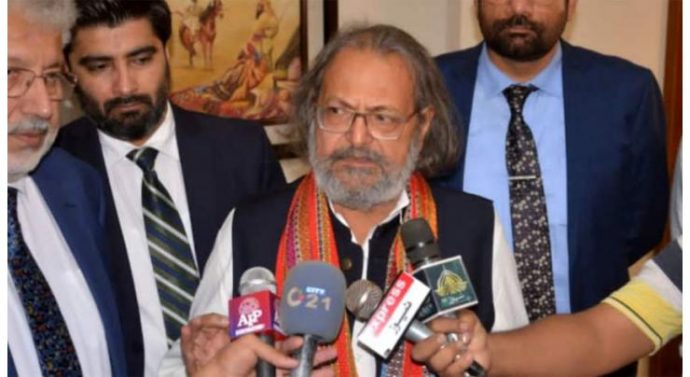
The acting federal minister for education, Madad Ali Sindh urges encouraged all political parties to set priority on education for elections 2024
In order to raise the standard of education in the nation, Madad Ali Sindhi, the acting federal minister for education and professional training, encouraged all political parties to include a priority on education and governance in their election manifestos for the ensuing five years. He emphasized that in order to realize the goals of high-quality education for everyone, we must concentrate on building educational infrastructure, enhancing the learning system, formulating sustainable policies and initiatives, as well as making sure that teachers are trained and enrolling out-of-school children. During visits to the regional offices of Allama Iqbal Open University (AIOU) and the Inter Board Coordination Commission (IBCC) in Karachi, the minister shared his opinions with the media and presided over meetings. The minister toured several departments within the regional offices to obtain a briefing on the operations, roles, responsibilities, challenges, and future plans of the organizations.
Over 25 million children are not in school, the state of public education institutions is in disarray, there is a gulf between parents and teachers, earmarked funds are not being used, and other issues point to the fact that political parties have historically ignored the education sector and failed to include it in their platforms. Bureaucracy has also not helped the situation. These observations were made by Madad Ali Sindhi. He insisted that since improving education is the only way to advance the nation, whichever political party wins the next general election will unavoidably spend its five-year term advocating for its improvement. He also emphasized that citizens should encourage their representatives to take action in this area.
There is a disconnect between parents and teachers, over 25 million children do not attend school, public education institutions are in disarray, earmarked funds are not being used, and other issues all indicate that political parties have historically disregarded the education sector and neglected to include it in their platforms. Furthermore not helping the matter is bureaucracy. Madad Ali Sindhi was the one who made these findings. He maintained that whichever political party wins the next general election will inevitably spend its five years pushing for education reform since it is the only way the country can grow. Additionally, he underlined that people ought to push their legislators to act in this regard.
Madad Ali Sindhi voiced concerns about drug abuse and harassment in educational settings, noting that the government was acting to address the problems. However, he suggested that parents and teachers work closely together, and that faculty members monitor students’ behavior to assist in resolving such problems. He emphasized the need for comprehensive policies, concerted efforts, and collaborative initiatives between the federal and provincial governments to promote education. He also stated that the education sector has been delegated to the provinces as a result of the 18th Amendment to the Constitution.
The minister was previously briefed by Prof. Dr. Ghulam Ali Mallah, Executive Director of IBCC, on the one window procedure and online verification system that were operational in IBCC and had greatly aided the students. Zulfiqar Ali Zardari, the assistant regional director of the AIOU Karachi office, gave a briefing on the 56 operational campuses of the Allama Iqbal Open University around the nation and the necessity for additional campuses to accommodate the large student body.

Content writer, educationist, teacher, researcher, social media manager, and a SEO manager from lahore. She has been working as a freelance academic and non-academic writer for more than 20 years now. She has a passion to learn new things and has a knack for writing and she combines both things to produce write ups she pours her heart out in.

